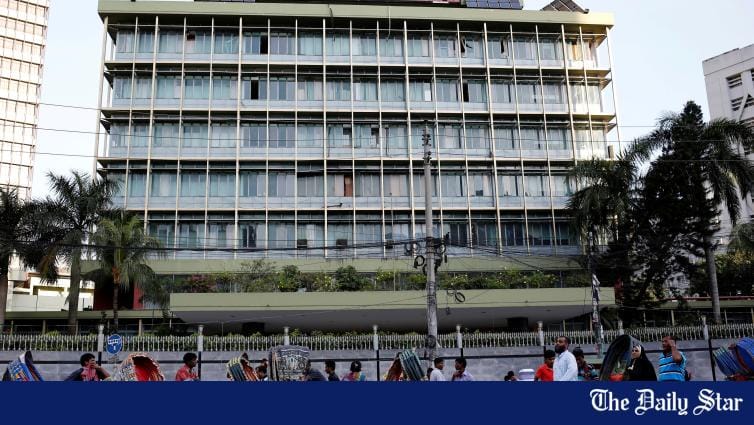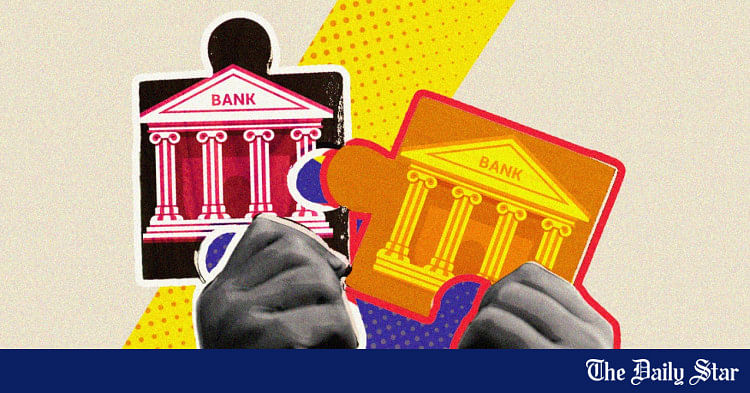- Copy to clipboard
- Thread starter
- #166
Saif
Senior Member
- Messages
- 14,237
- Reaction score
- 7,473
- Origin

- Residence

- Axis Group


Empowering central bank with sweeping powers
One of the reasons why the nexus of corrupt politics and its crony oligarchs could get away with plundering the banking sector during the autocracy was the powerlessness of the Bangladesh Bank (BB) to stop it. Obviously, the interim government under the dispensation of post-July uprising realised t
Empowering central bank with sweeping powers
Published :
May 14, 2025 00:07
Updated :
May 14, 2025 00:07

One of the reasons why the nexus of corrupt politics and its crony oligarchs could get away with plundering the banking sector during the autocracy was the powerlessness of the Bangladesh Bank (BB) to stop it. Obviously, the interim government under the dispensation of post-July uprising realised the urgency of equipping the BB with the necessary legal tools so it could exercise its authority to rescue the fragile banking sector by way of taking actions against non-compliant/sick banks to protect depositors and borrowers. As chronic fragility of the banking sector has caused significant erosion in the public's as well as the investors' trust in the banking system, the financial institutions division under the finance ministry in February this year published the draft law titled the Bank Resolution Ordinance, 2025 granting the BB sweeping powers to do what was necessary to save the banking sector plagued by various malpractices including scams, poor governance, weak compliance, heists and ever-rising volume of the non-performing loans (NPLs).
The government through a gazette notification on Friday, May 9 last published the ordinance under which a troubled bank could be restructured or liquidated in a way that the process minimizes the failing bank's impact on the depositors, other banks and the broader economy. Undeniably, it is a landmark step by the government towards restoring discipline in the financial, or for that matter in the banking sector. Thus, the Bank Resolution Ordinance is endowed with broad powers to intervene in case any of the banks or financial institutions, state-owned or private, or foreign, found compromised. The BB would then take steps to dissolve a struggling bank appoint temporary administrator, transfer its assets to another state-owned entity, the so-called bridge bank. The bridge bank, on its part, is a special type of bank authorised to take over and operate a failing bank for a limited period of time. In fact, it acts as a bridge allowing time for a potential buyer to be found or explore other resolution options. Also, another function of the bridge bank is to act as an isolator so as to isolate the distressed bank from the broader banking sector to prevent panic withdrawal by depositors.
The whole purpose of a bridge bank, therefore, is that the clients of a struggling bank can continue to access, for instance, their deposits or get other financial services seamlessly. Now, the BB will also be able to raise capital through new or existing shareholders to strengthen financial position of a distressed bank. Evidently, a fund, styled, 'Bank Restructuring and Resolution Fund' will be created through government contributions, international financial institutions, risk-based levies on banks and so on. However, in case, the struggling bank fails to meet capital or liquidity requirements or its owners engage in fraudulent practice, the BB will have the power to take corrective measures as necessary.
Now, as designed, the BB has its powers to clean up the mess in the banking sector created over the decades, especially during past one and a half decades of autocracy. But it is one thing to have power, quite another to exercise it. The question arises because, the country had never any dearth of laws. But what it was wanting in was their execution. Hopefully, this time the banking sector regulator will show its teeth, if and when needed.
Published :
May 14, 2025 00:07
Updated :
May 14, 2025 00:07
One of the reasons why the nexus of corrupt politics and its crony oligarchs could get away with plundering the banking sector during the autocracy was the powerlessness of the Bangladesh Bank (BB) to stop it. Obviously, the interim government under the dispensation of post-July uprising realised the urgency of equipping the BB with the necessary legal tools so it could exercise its authority to rescue the fragile banking sector by way of taking actions against non-compliant/sick banks to protect depositors and borrowers. As chronic fragility of the banking sector has caused significant erosion in the public's as well as the investors' trust in the banking system, the financial institutions division under the finance ministry in February this year published the draft law titled the Bank Resolution Ordinance, 2025 granting the BB sweeping powers to do what was necessary to save the banking sector plagued by various malpractices including scams, poor governance, weak compliance, heists and ever-rising volume of the non-performing loans (NPLs).
The government through a gazette notification on Friday, May 9 last published the ordinance under which a troubled bank could be restructured or liquidated in a way that the process minimizes the failing bank's impact on the depositors, other banks and the broader economy. Undeniably, it is a landmark step by the government towards restoring discipline in the financial, or for that matter in the banking sector. Thus, the Bank Resolution Ordinance is endowed with broad powers to intervene in case any of the banks or financial institutions, state-owned or private, or foreign, found compromised. The BB would then take steps to dissolve a struggling bank appoint temporary administrator, transfer its assets to another state-owned entity, the so-called bridge bank. The bridge bank, on its part, is a special type of bank authorised to take over and operate a failing bank for a limited period of time. In fact, it acts as a bridge allowing time for a potential buyer to be found or explore other resolution options. Also, another function of the bridge bank is to act as an isolator so as to isolate the distressed bank from the broader banking sector to prevent panic withdrawal by depositors.
The whole purpose of a bridge bank, therefore, is that the clients of a struggling bank can continue to access, for instance, their deposits or get other financial services seamlessly. Now, the BB will also be able to raise capital through new or existing shareholders to strengthen financial position of a distressed bank. Evidently, a fund, styled, 'Bank Restructuring and Resolution Fund' will be created through government contributions, international financial institutions, risk-based levies on banks and so on. However, in case, the struggling bank fails to meet capital or liquidity requirements or its owners engage in fraudulent practice, the BB will have the power to take corrective measures as necessary.
Now, as designed, the BB has its powers to clean up the mess in the banking sector created over the decades, especially during past one and a half decades of autocracy. But it is one thing to have power, quite another to exercise it. The question arises because, the country had never any dearth of laws. But what it was wanting in was their execution. Hopefully, this time the banking sector regulator will show its teeth, if and when needed.















